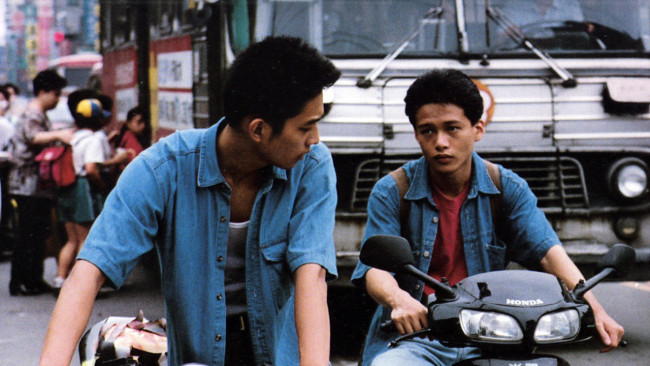How well do we disappear into the movies we watch?
Typically, the impetus to forgo all preconceived notions—suspend disbelief —solely relies upon our ability to temper our levels of snark toward a film, but it never hurts when a filmmaker does their due diligence and lubricates the transition from reality to “fantasy” with filmmaking sleight of hand. However, one of the beauties of foreign language films—(foreign to me)—is the lack of familiarity with the languages, the settings, the actors. It makes the transition from skepticism to forbearance all the more enchanting. It’s the unfamiliarity that hypnotizes me so quickly. I don’t have to wrack my brain reconciling erroneous casting decisions, such as: Charlton Heston as a Mexican narc inTouch of Evil, or Andrew Garfield and Emma Stone pretending to be ten years younger than they actually are in The Amazing Spiderman.
As is the case with most foreign films—(and for painfully obvious reasons)—I’m unable to inject my analysis with grandiose proclamations regardingAMERICA!. I’m too busy catching up with the culture, the atmosphere, the distinctive names and faces to offer a nationalistic reading on the film. Instead, I’m able to let the plot unravel organically, and observe the characters from the point-of-view of a welcome—and sometimes not-so welcome—tourist sitting outside a café not too far from his hotel.
It’s like people watching, minus the condescension. But still, with a lack of understanding. I watch, I decipher the actions, but I hope not to presume to know any better. This isn’t my home, these are not the people I’m accustomed to. All I can do is find that angle most relative to me.
For instance:
Lets discuss Chinese-born director Ming-liang Tsai’s debut film Rebels of the Neon God: I don’t know the faces, the culture, the language, nor do I totally understand the subject matter, nor the politics, economy, social awareness of Taipei and its denizens—which leaves me limited room to project my own neurosis or ideas or themes or politics onto Tsai’s story—but! there’s still enough vague malleability, enough universal humanity, for me to scrounge together a narrative of my own.
All the same: I have to accept the movie at face value. It’s like riding shotgun on a motorcycle that’s hurtling at neck-break speeds: you have to hug the driver tight and hope he or she doesn’t slip or skid or spin into death. You need complete faith. You need a blank mind. You can’t think ahead, you can’t think outside the film’s frame, because there ISN’T anything to think about—not that I’m aware of. I don’t know enough about Taipei and its happenings to corrupt my own thoughts with navel-gazing theories. This land, this world, this point of reference is beyond my comprehension. Most importantly, this unknown world offers few tangential distractions—distractions that would otherwise fill my head with Fourth-Wall-shattering meditations. You don’t see Will Smith flashing by with a thumb’s up, winking his “everything will be okay” wink. You don’t have Tom Cruise fucking up your process, your momentum, by inciting thoughts of: “C’mon dude, did you really need to flip a shit on Oprah’s couch? You Scientologist motherfucker you.” You don’t have to deal with the added burden of watching Hollywood faces eclipse their on-screen personas with off-screen baggage.
Instead, you have a handful of kids in Taipei at various states of disillusionment: jacking change from unguarded pay phones, pinning down cockroaches with the pointed end of their compasses, calling up random men for anonymous sexual encounters—in general: whittling away the tedium of a life without providence. These are kids who’ve had words like “future” and “trajectory” struck from their vocabulary. Even Hsiao-Kang (Kang-sheng Lee), who has a pair of decent enough parents, both of whom are employed and present, who’ve set him up at a private school worth ten-thousand a year—this kid, whose life is one long list of checked-off requirements, the kind of requirements that pave the way to success or—at the very least—manageable mediocrity—even he can’t help but feel like the aforementioned cockroach pinned by education, pinned by culture, pinned by all the stringent necessities forced upon him by his father. He doesn’t have to be a street thug like Ah Tze (Chao-jung Chen) and Ah Bing (Chang-bin Jen) to feel like a fuck up. He has his father and school and a municipal tow truck to accomplish that.
The movie truly begins with perceptions misconceived. An easily avoidable blip that somehow fast-tracks into a BANG!
Playing hooky with his temperamental father, Hsiao-Kang spots Ah Tze weaving through traffic on a bonafide motorcycle. Not a moped or scooter like everyone else. But a Big Boy Motorcycle. Draped around Ah Tze, in tight embrace, is a girl. A young girl. A highly sexualized girl. For Hsiao-Kang it’s pure vision, third eye shit, like lightning-struck prophecy: Ah Tze as the consummate badass. Hsiao-Kang sees his dream: Jimmy Dean—rebelliousness personified. He sees this king zoom by on his two-wheeled chariot. A young man higher than the highest oppressor, higher than Hsiao-Kang’s father who—as it turns out—wields little-to-no power outside their household. Annoyed by the persistence of Hsiao-Kang’s father’s horn—HOW DARE THIS LOWLY CITIZEN STRIKE OUT AT THE KING’S PRIDE?!?!?!—Ah Tze smashes the car’s side-view mirror.
This is a bad, baaaaaaad boy, and Hsiao-Kang wants in.
Little does he know: there’s no deeper clog than the one blocking Ah Tze’s pipes.
If only Hsiao-Kang could see right. All he has to do is step around the James Dean-looking figure at the local arcade to see that Dean ain’t nothing more than a flimsy cutout. As is Ah Tze.
Ah Tze has money, but only for brief spells. He still has to venture out every night with his crony to sustain his days. 24-hour windows of easy breathing, then it’s back up, back out, back on the street busting into arcades to steal motherboards for extra pay. But it amounts to nothing. A squalid life in a teeny-tiny apartment he shares with his absentee brother. An existence spent wading through floods. Every time it rains, the water creeps up and out of the drain in his kitchen floor. Sometimes it subsides. Sometimes he gets to dry his toes. But not for long. Only till it rains again, when the water resurfaces.
Unfortunately, Hsiao-Kang doesn’t know this. All he knows is what he sees, which is a story obfuscated by a giant, maw-like blank. And he fills that blank however he sees fit. These are kids who shop and eat and drink away whatever money they get their hands on. When set in front of a television, their programming of choice is pixillated porn. They live by their senses. They’re chained to their impulses. When, finally, Ah Tze has been beaten down, whipped into a corner, after he’s lost the motherboards—a major payday—to an imposing group of arcade-owning hooligans, he smashes a desperate kiss into his girlfriend Ah Kuei’s (Yu-Wen Wang)’s face and asks her to run away with him. Battling her own torrent of tears she asks him, “But where to?” A couple of kids without an exit strategy. Even worse: without the funds to carry one out. They’re stuck there, in a flood that never recedes long enough for them to breathe.
Hsiao-Kang doesn’t see any of this. All he sees are cool-as-shit gangsters and their motorbikes.
Waiting for Ah Tze to park his prized possession and find refuge with his little lady lover, Hsiao-Kang pounces on Ah Tze’s bike as soon as he’s out of sight. He knifes the seat to shreds, smashes up the wind guard, and—in a moment of spontaneous genius—fills the bike’s ignition with crazy glue. At first, the audience is meant to translate this into an act of vengeance—for fucking with his dad’s car. But it doesn’t end there. He takes a room out in the same hotel and waits and watches till Ah Tze leaves. He watches as this puffed-up gangster boy finds his bike, finds his tragedy, and—celebrating some kind of private victory over Ah Tze—hops up and down in his own bed till he jumps so high he cracks his head against the ceiling. Hahahah!—a great cosmic joke: even with the upper hand—the grand position of main oppressor—there’s still a ceiling there to bounce you back down.
For Hsiao-Kang, life’s an arcade. A simulation. A consideration: How far can I bend this before it snaps? How long can I bang on this window, this cockroach, before it cracks? How long can I live on the tuition I stole from my parents before hitting rock bottom? He follows Ah Tze, who pushes his now useless motorcycle around Taipei. He sidles up to his victim and asks him if he needs any help. “Fuck off!”
Hsiao-Kang nibbles at Ah Tze’s life from the fray—sideways nibbles. Nothing but misleading peripherals. What he doesn’t realize is that by envying this James Dean wannabe, by vandalizing his bike, by supposedly chinking the armor of a “slick, smooth” dude, that he’s destroyed Ah Tze’s lifeline. His hopes. Even though those hopes were limited and based on a culture that is way out of his pay grade, it was something to look forward to, to help slog through the doldrum of a life mired in sludge.
And it’s all because Hsiao-Kang thinks that Ah Tze has a life worth desiring. But it’s all fantasy. In their own ways, their oppression is interchangeable. One and the same. No matter the chasm yawning between their socio-economic standings, they’re both itty-bitty beings with the bulwark of an entire society obsessed with “what’s he got that I don’t?” being rammed into their heads through a pinpricked hole.
These are the rebels of the Neon God.






